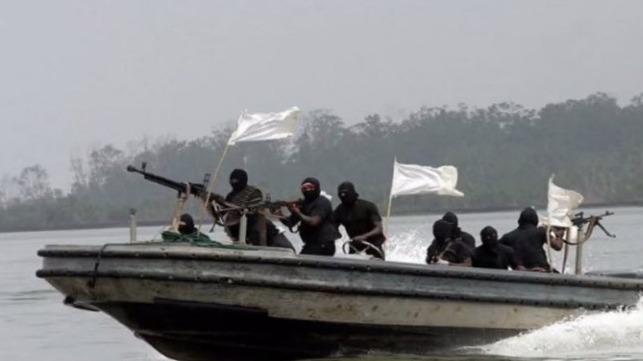The Government of Nigeria and a coalition of global shipping stakeholders have launched a new strategy to end piracy, armed robbery, and kidnapping in the Gulf of Guinea (GoG).

The strategy establishes a mechanism to periodically assess the effectiveness of country-piracy initiatives and commitments in the GoG. Targeted at all stakeholders operating in the region, it will identify areas of improvement and reinforcement in order to eliminate piracy.
The plan is split into two mutually supportive sections, (1) actions which can be overseen by the Nigerian Industry Working Group (NIWG), and (2) actions which require engagement with other regional and international partners. The strategic ambition of the coalition is to eliminate piracy in the GoG, to secure trade routes, reassure traversing crews, and support local communities.
In May, the UN Security Council condemned the GoG as the world’s piracy hotspot. Despite the International Maritime Bureau’s Piracy Reporting Center tracking an overall drop in global piracy during 2021, threat levels in the region remain high.
Maritime security in Nigeria: what you need to know
Piracy activity in the GoG has posed a severe threat to seafarers and local communities for over a decade. In 2020, 40 percent of piracy attacks, and 95 percent of crew kidnappings occurred in the region. However, attacks decreased by nearly 60 percent in 2021, following the establishment of Deep Blue, the Nigerian Navy and Nigerian Maritime Safety Agency (NIMASA) anti-piracy project, and increased international counter-piracy operations in the GoG.
The newly launched strategy was developed by the International Chamber of Shipping (ICS), BIMCO, Intertanko, Intercargo, Oil Companies International Marine Forum (OCIMF), and representatives of the Nigerian Navy and NIMASA, together making up the NIWG.
Bashir Jamoh (pictured, standing), Director General of NIMASA, said: “Working collaboratively with state and non-state actors, the maritime industry’s various critical players and stakeholders have highlighted key areas where they can make collective improvements. This strategy is an important step in codifying joint efforts to sustain maritime security in the Gulf of Guinea. It will be an important tool to monitor our progress.”
Guy Platten, Secretary General of ICS, commented: “The agreement of this strategy demonstrates the strong relationship between the shipping industry and Nigeria, and their shared commitment to eradicating piracy in the Gulf oGuinea. The strategy is already identifying successes and areas in which further improvement will continue to reduce the capability of pirates to attack innocent seafarers in the region.”
David Loosley, Secretary General and CEO of BIMCO, said: “The joint counter-piracy strategy is a welcome result of productive dialogue between Nigerian authorities and industry partners. The long-term success of the joint strategy relies on establishment of structures and incentives which will stimulate a sustainable change in the Niger Delta pirates’ behaviour.”
Katharina Stanzel, Managing Director Intertanko, said: “The agreement on the Gulf of Guinea Strategy marks a significant point in the fight against piracy and insecurity in this region. Seafarers have borne this burden for too long and this agreed strategy, with its associated KPIs will assist in making their time on ships in the area safer and more secure.”
Kostas Gkonis, Secretary General Intercargo, elaborated: “With this new strategy the shipping industry is beginning a new journey alongside Nigeria, an organised approach to tackle security in the waters in the Gulf of Guinea. It is only the first step, and the partners must continue to work together to ensure continuous improvement and ensure that the shipping community and the local economy see real change as a result of the strategy”.
Karen Davis, OCIMF Managing Director, said: “The need to identify and prioritise those issues which can help prevent harm to our seafarers is of paramount importance. This joint strategy provides clarity to the activities that, when tackled collaboratively, will make a difference. A positive effect has already been demonstrated.”
A spokesperson of the Nigerian Navy concluded: “The Nigerian Navy plays a vital role in ensuring maritime security. Collaborating with national as well as international stakeholders is most important, and this joint strategy demonstrates the good that can be achieved by working together.”
Source: Hellenic Shipping News